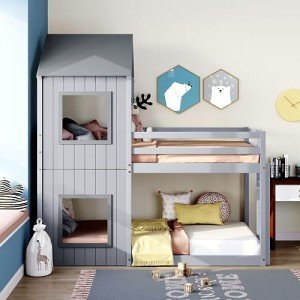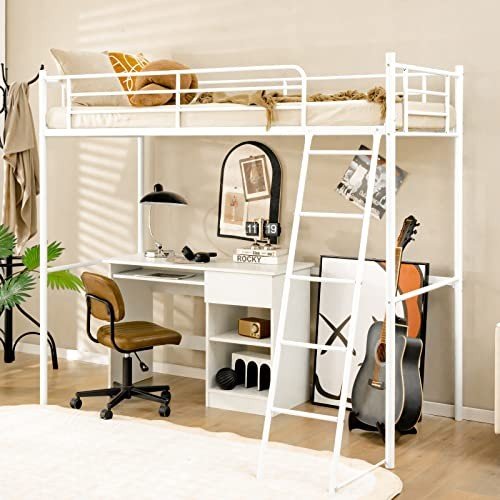The Ultimate Guide to Kids Bunk Beds: Maximizing Space and Fun
With the rise of vertical living and smaller sized areas, the popularity of bunk beds has actually soared among families. Bunk beds not just use a practical sleeping service, particularly in shared rooms, however they also bring an element of enjoyable into a kid's life. This thorough guide delves into the features, advantages, and considerations of kids' bunk beds, making it much easier for parents to select the ideal bed for their kids.
Features of Kids Bunk Beds
Bunk beds are flexible pieces of furniture that serve more than a single function. Here are some essential features to think about:
| Feature | Description |
|---|---|
| Material | Bunk beds can be constructed from wood, metal, or a mix of both, offering varying levels of toughness and design choices. |
| Safety Features | Many bunk beds Bunk beds come geared up with guardrails, safe and secure ladders, and topped assistances for safety, specifically important for kids. |
| Design Variety | Choices vary from classic styles to modern-day styles, ensuring a match for any room décor. |
| Space-Efficiency | bunk bed for sale beds use vertical space, making them ideal for smaller sized rooms. |
| Convertible Options | Some models can be converted into two different beds, supplying flexibility as kids grow. |
| Storage Solutions | Some bunk beds include built-in storage drawers or shelves, assisting to keep the room organized. |
Benefits of Kids Bunk Beds
Purchasing a bunk bed features a number of benefits:
- Space Saving: Bunk beds maximize floor space, permitting more backyard or storage solutions.
- Enjoyable Factor: With a cheap bunk beds bed, kids belong that cultivates imagination and friendship during pajama parties or playdates.
- Affordable: Instead of purchasing two different beds, a bunk bed can accommodate 2 kids at the same time, saving cash in the long run.
- Versatility: Many bunk beds can be disassembled or converted into twin beds, making them a long-lasting investment as children's requirements alter.
- Social Interaction: Bunk beds encourage family bonding and friendships, providing an inviting space for kids to share stories and laughter.
Factors to consider When Choosing a Kids Bunk Bed
When choosing the best bunk beds bunk bed for a kid, parents need to consider numerous factors:

- Safety Standards: Ensure that the bunk bed complies with safety regulations and comes with essential safety features.
- Age Appropriateness: Different designs cater to various age. For example, traditional bunk beds may not appropriate for younger kids.
- Room Dimensions: Measure the bedroom to guarantee the bunk bed fits appropriately, permitting for space to move around conveniently.
- Weight Capacity: Consider the weight load of each bed and guarantee it accommodates the child's weight easily.
- Design Preferences: Letting children take part in the choice procedure can assist them feel more thrilled about their new bed.
Kinds Of Kids Bunk Beds
Bunk beds come in different styles and setups to suit various requirements:
| Type | Description |
|---|---|
| Requirement Bunk Bed | A traditional design with one bed stacked on top of another, usually utilizing a ladder to access the top bunk. |
| L-Shaped Bunk Bed | Features two bunk beds connected in an L-shape, typically more spacious and suitable for kids sharing a room but needing a bit more space. |
| Triple Bunk Bed | Comprises three stacked beds, ideal for optimizing sleeping arrangements in really restricted spaces. |
| Loft Bed | A raised bed with space below that can serve as a play location, study corner, or extra storage. |
| Futon Bunk Bed | Combines a bunk bed on the top with a futon or sofa underneath, making it great for pajama parties and maximizing room use. |
| Convertible Bunk Bed | Can be separated into two specific beds, providing flexibility as children's needs alter. |
Caring for Kids Bunk Beds
Keeping bunk beds is important for guaranteeing durability and safety. Here are some easy care practices:
- Regular Inspections: Check the bed regularly for loose screws and tightened up bolts to make sure stability.
- Cleanliness: Keep bedding clean and fresh, rotating mattresses for even use.
- Guardrails: Ensure guardrails are secure and in place, particularly if children tend to move a lot in their sleep.
- Air Circulation: Ensure the bed has adequate airflow, avoiding wetness accumulation that can lead to mold or mildew.
FAQs About Kids Bunk Beds
Q1: At what age can a kid securely use a bunk bed?
A1: Generally, children aged six and older are considered safe to use the upper bunk due to the height and stability factors included.
Q2: Can I position a bunk bed near a window?
A2: It is a good idea to avoid placing a bunk bed near windows to decrease the danger of falling or injuries.
Q3: Are bunk beds safe for younger kids?
A3: While some modern bunk beds feature security features accommodating more youthful kids, it is generally advised to wait till they are older, generally over 6 years.
Q4: What is the common weight limit for leading bunks?
A4: Weight limits vary by model however normally vary from 150 to 250 pounds. Always refer to the producer's requirements.
Q5: How frequently should I examine the bunk bed's safety functions?

A5: It is suggested to conduct a security check every few months or whenever you observe any signs of wear.
Kids' bunk beds function as a strategic option for households seeking to take full advantage of space while offering a fun and interesting sleeping environment for their kids. With a variety of options available-- from standard designs to loft beds-- moms and dads have the freedom to choose something that meets their family's specific needs. By thinking about vital aspects such as security, room suitability, and their children's preferences, moms and dads can make an educated option, making sure that each child is thrilled about bedtime while benefiting from an efficient space.








